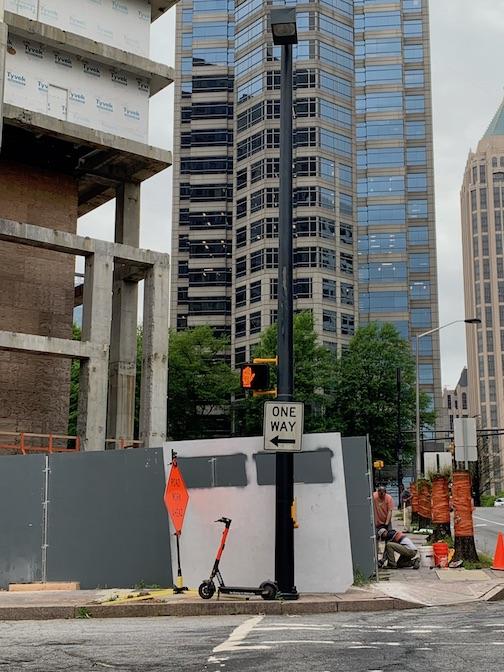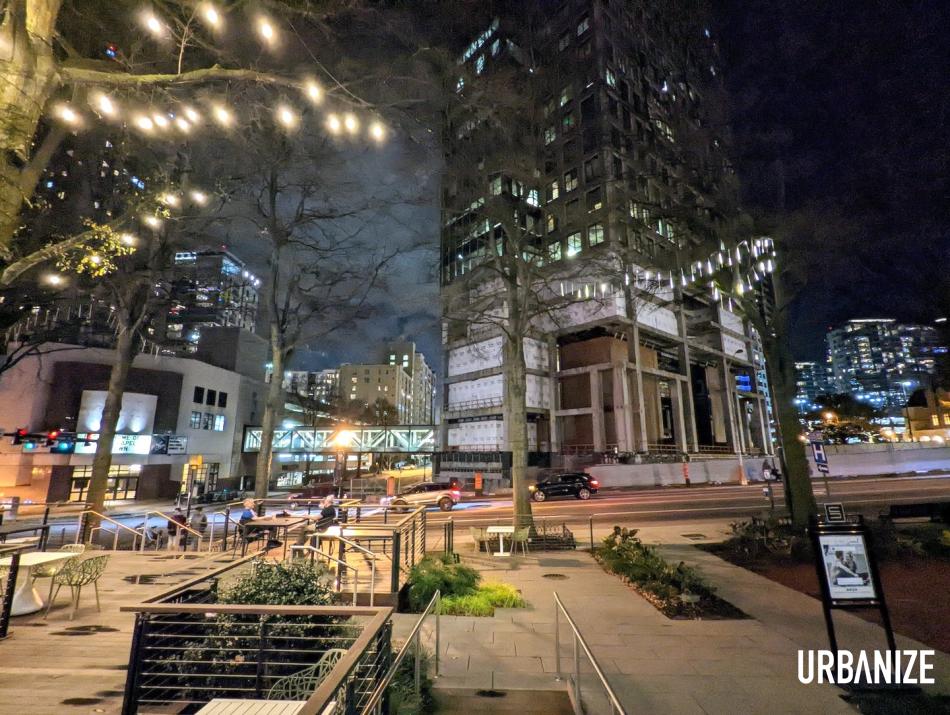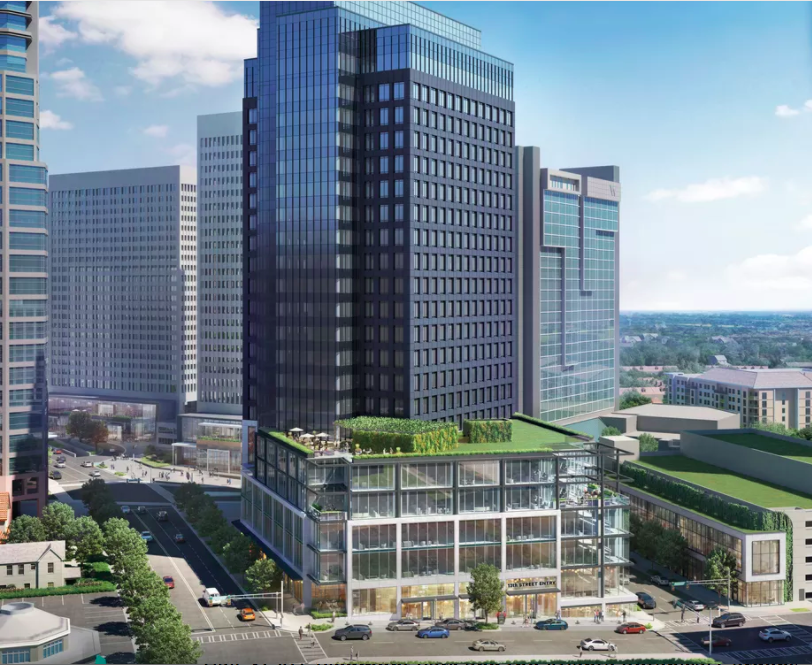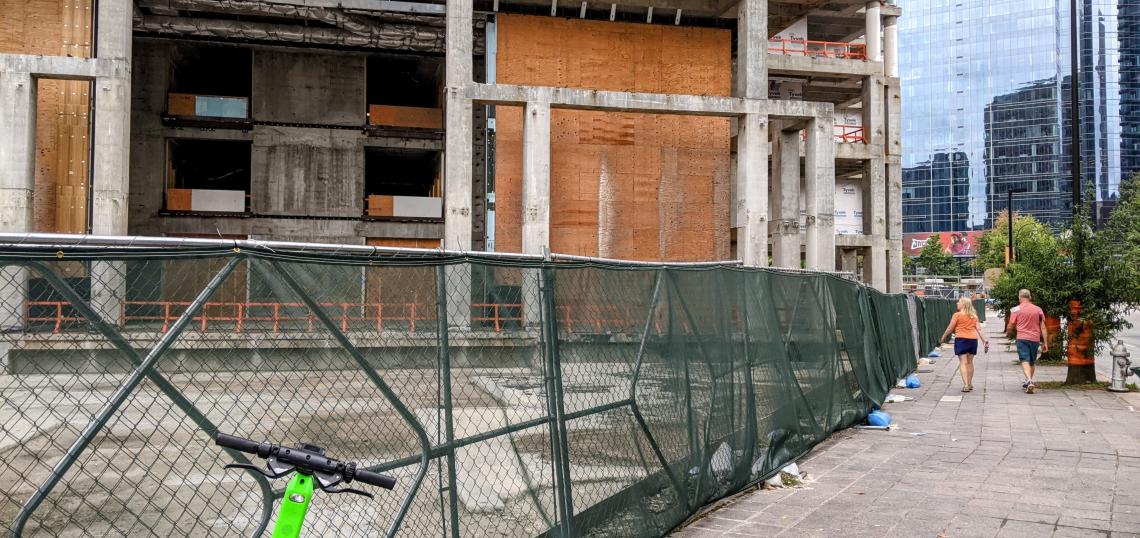Encouraging signs have recently emerged for anyone who’s been irked by an idle, unsightly construction site at one of Atlanta’s more high-profile intersections.
Over the past two weeks, workers have installed and painted more private wooden fencing around the base of Campanile Plaza at 1155 Peachtree Street. That's helping to obscure what officials with the City of Atlanta’s Office of Buildings filed a complaint against in September, decrying the site as an “abandoned project.”
Campanile’s owners, Dewberry Group, began a renovation of the 21-story tower’s base floors in 2019, encircling a full city block in construction fencing while gutting lower floors and tearing out exterior common areas. Construction ceased in early 2020, and little or no visible work has recommenced at the southeast corner of Peachtree and 14th streets.
But according to Midtown Alliance, that could change.
Dewberry Group has submitted an application for a Special Administrative Permit—a necessary step before building permits can be issued—to the city.
 Workers installing more private wooden fencing around the base of the Campanile building in April. Submitted
Workers installing more private wooden fencing around the base of the Campanile building in April. Submitted
Dewberry officials are expected to come before the Midtown Development Review Committee at the board’s next meeting May 10, according to Midtown Alliance, which plans to release its agenda for that meeting the Friday before.
The Midtown DRC, an appointed board, vets developers’ proposals, suggests alterations, and provides recommendations to the City’s Office of Planning before projects move forward in the district.
We’ve asked Dewberry reps for information on where the project stands and what changes, if any, might be in store. We’ll update this story with any additional intel that comes.
Since the depths of the COVID-19 pandemic, Midtown residents in particular have complained about the unfinished Campanile work and how it devolved into a weedy eyesore. More recently, the site has been on full display for patrons of Colony Square’s The Grove, part of a $400-million redevelopment across the street.
The complaint against Dewberry Group—led by prominent Midtown landowner John Dewberry, who's been described by national media as Atlanta's "emperor of empty lots" for his willingness to sit on land and rebuff big-time offers—was filed on September 27. It’s unclear what punitive action, if any, the city took.
Property developers in Atlanta can’t leave sites idle in perpetuity without facing fines or other repercussions, whether they’re redoing a porch or erecting a skyscraper, as city officials have previously told Urbanize Atlanta.
In an interview with the AJC in November, Dewberry blamed Campanile’s delays on several factors. Those have included a dispute with a contractor, the pandemic, and one marquee tenant (SunTrust, now Truist Bank) relocating and consolidating its offices downtown, per Dewberry. The newspaper also found that “financial snags” have taken a toll, including a $186-million loan considered to be distressed.
 View from Colony Square's The Grove to developer Dewberry Capital's long-stalled Campanile Plaza building redevelopment, as seen in December. Josh Green/Urbanize Atlanta
View from Colony Square's The Grove to developer Dewberry Capital's long-stalled Campanile Plaza building redevelopment, as seen in December. Josh Green/Urbanize Atlanta
Nonetheless, Dewberry vowed to march on (and clad the tower’s base in marble, while adding a penthouse office suite), with expectations to file revised architectural plans early this year, per the November interview.
Built in 1987 as Bell South’s corporate headquarters, the 450,000-square-foot Campanile was purchased by Dewberry Group in 2010. Several years ago, the company completed a renovation that purged the Class A building of its 1980s datedness on upper floors, but its lobbies and plazas were still lacking an engaging connection with surrounding streets.
The design update at the tower’s base has been more than five years in the making.
 Plans for the revised Campanile base as seen from the south, per initial renderings. Revisions are expected to come before the Midtown Development Review Committee next week.
Studio Dewberry
Plans for the revised Campanile base as seen from the south, per initial renderings. Revisions are expected to come before the Midtown Development Review Committee next week.
Studio Dewberry
Per the most recent available plans, the renovation calls for a 50,000-square-foot addition of two-story retail, plus modernized lobbies that Dewberry Group leaders feel could be among “the world’s most inspirational,” according to the company’s website.
Dewberry Studio, the company’s design component, drew up that Campanile redo in partnership with Berkley-based Wong Logan Architects and architect Peter Logan of New York City.
Plans originally called for the revised Campanile to debut last summer.
• Images: Closer look at two-tower proposal in heart of Midtown (Urbanize Atlanta)







